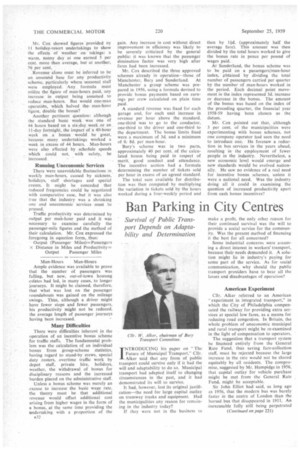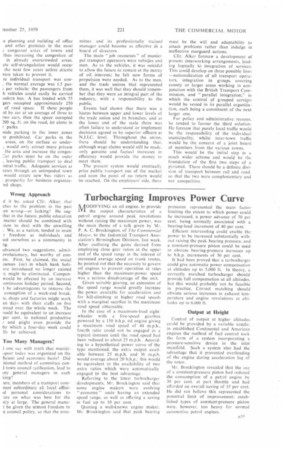Ban Parking in City Centres
Page 66

Page 69

If you've noticed an error in this article please click here to report it so we can fix it.
Survival of Public Transport Depends on Adaptability and Determination
INTRODUCING his paper on "The Future of Municipal Transport," CHI.. Alker said that any form of public transport could survive only if it had the will and adaptability to do so. Municipal transport had adapted itself to changing circumstances in the past, and it had demonstrated its will to survive.
It had, however, lost its original justification—the need for large capital outlay on tramway tracks and equipment. Had the municipalities any reason for remaining in the industry today?
If they were not in the business to
make a profit, the only other reason for their continued survival was the will to provide a social service for the community. Was the present method of financing it the best for all concerned?
Some industrial concerns were assuming a direct interest in workers' transport, because their needs demanded it. A solution might lie in industry's paying for some part of the service. As for social communication, why should the public transport providers have to bear all the losses and disadvantages of operation?
American Experiment Cllr. Alker referred to an American " experiment in integrated transport," in which the City, of Philadelphia compensated the railway for providing extra services at special low fares, as a means for reducing road congestion. In Britain, the whole problem of uneconomic municipal and rural transport might be re-examined in the light of compensation to operators.
The suggestion that a transport system be financed entirely from the General Rate Fund, finis saving fare-collection staff, must be rejected because the large increase in the rate would not be shared equitably by all residents. The compromise, suggested by Mr. Humpidge in 1956, that capital outlay for vehicle purchase might be met from the General Rate Fund, might be acceptable.
Sir John Elliot had said, as long ago as 1956, that the modern bus was barely faster in the centre of London than the horsed bus that disappeared in 1911. An inexcusable folly still being perpetrated le planning and building of office and other premises in the most i congested areas of towns and thus increasing the congestion of in already overcrowded areas. ete self-strangulation would occur the next few years unless drastic vere taken to prevent it.
re individual transport was con, the normal average was 1.5 pas; per vehicle: the passengers from h vehicles could easily be carried iodern bus. A bus loaded with 75 gers occupied approximately 250 of road space. If these people !4:1 by car at an average of three to wo cars, then the space occupied 100 sq. ft. on the road, let alone in r parks.
iside parking in the inner zones )e prohibited, Car parks in the areas, on the surface or under, would only attract more private the area and .increase the coops7.ar parks must be on the outer , leaving public transport to deal :ntral traffic. Adequate services at rates through an unimpeded town would create new bus riders as prosperity for business organizand shops.
Wrong Approach
d it be, asked Cllr. Alker, that ches to the problem in the past en wrong—or lacking? He sugthat in the future, public education matter should be combined with sion to deal with the unwilling . We, as a nation, tended to insist r freedom as individuals and ied ourselves as a community in rig.
alvanced two suggestions, admitevolutionary, but worthy of conon. First, he claimed, the social .tances (sic) in which bank holiere introduced no longer existed ,y might be eliminated. Compenwould be effected by an increase :ontinuous holiday period. Second, t be advantageous to remove the conceptiOn of a week-end break. s. shops and factories might work en days with their staffs on five )read over the whole week. The /ouId be equivalent to an increase per cent. in national productive / and might even provide the by which a four-day week could Ily be achieved.
Too Many Managers?
I one say with truth that municisport today was organized on the ficient and economic basis? Did itional method of committee conl town council ratification, lead to my general managers in each king?
ure. members of a transport cornnust subordinate all local affiniid personal considerations to -ate on what was best for the tity at large. The general manat be given the utmost freedom to it council policy, so that the corn
mittcc and its professionally trained manager could become as effective a board of directors.
The. main "job resources" of municipal transport operators were vehicles and men. As to the vehicles, it was suicidal to allow the future to remain at the mercy of oil, interests; he felt new forms of propulsion were needed. As to the men, and the trade unions that represented them, it was well that they should remember that they were an integral part of the industry, with a responsibility to the public.
Events had shown that there was a hiatus between upper and lower levels of the trade union and its branches, and at the lower end of the scale there was often failure to understand or implement decisions agreed to by superior officers at N.J.I.C. level. Throughout the union, there should be understanding that, although wage claims would still be made, only genuine and factual increases in efficiency would provide the money to meet them.
The present system would eventually price public transport out of the market and soon the point of no return would be reached. On the employers' side, there must be the will and adaptability to attack problems rather than indulge in ineffective rearguard actions.
ClIr. Alkcr foresaw a development of present interworking arrangements, leading logically to integration of services. This could develop on three possible lines —nationalization of all transport operators, integration in groups covering county or larger areas working in conjunction with the British Transport Commission, and 'parallel integration," in which the control of grouped services would be vested in its parallel organization, each being a constituent of the next larger one.
For policy and administrative reasons. he tended to favour the third solution. He foresaw that purely local traffic would be the responsibility of the individual municipality, whilst inter-town traffic would be the concern of a joint board of members from the various towns.
This would be the initial step in a much wider scheme and would be the foundation of the first two steps of a Pyramid. There should be a definite division of transport between rail and road. so that the two were complementary and not competitive.




















































































































